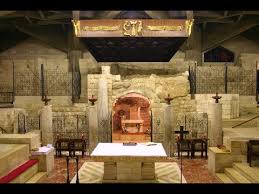We can’t say what fruitfulness will come of the Eucharistic Revival underway in the United States. What we do know is that it’s urgently needed and long overdue. And we’ll see if our bishops’ three-year emphasis on Eucharistic dogma and practice will renew the faith in America, or not. At least now we’ve recognized the enormous gap between what the Church teaches about the Eucharist and how Catholics live out that teaching in our nation.
But I’m wondering if a Penitential Revival is equally urgent. The troubling signs that prompted the Eucharistic Revival are even more apparent when it comes to the Sacrament of Penance. And it’s notable that we haven’t been talking much about it.
I began my priestly ministry twenty years after the close of the Second Vatican Council, and there was already grave concern about the diminishing number of Catholics using the Sacrament of Penance. In Reconciliatio et Paenitentia (1984), Pope Saint John Paul II referred to the Sacrament of Penance as in a crisis. (28) As crises go, we would have to say that this one has not leveled off; it has only worsened.
It’s not just the precipitous decline in the number of Catholics who go to the sacrament; it’s that and more. When I was a grade school student in the 1960s, Catholic children often went to sacramental confession on their own in places like Brooklyn, New York. As a confessor today, I never see or hear children coming on their own on a Saturday afternoon.
It’s not just that the kids need parents to provide a ride; it’s that they are inadequately catechized. They don’t know, for instance, how to do a proper examination of conscience; they don’t know the act of contrition; and they don’t know what a penance is. If they are lucky enough to have been introduced to these aspects of the sacrament, there certainly is no reinforcement by their parents – except, of course, with homeschooling parents.
By far though, the most unsettling aspect of the decline has been the near total evisceration of a sense of sin. This too is noted in Reconciliatio et Paenitentia. Pope Saint John Paul II starts by invoking a predecessor, Pius XI (pope between 1922-1939), who observed that “the sin of the century is the loss of the sense of sin.” (18) From there, the pontiff gives an account of the eclipse of sin. He cites the influence of secularism, the over-reliance on psychology and sociology for evaluations of personal responsibility, and a relativistic understanding of ethics.

Actually, it was not a churchman who first sounded the alarm in the culture at large about the loss of a sense of sin in the U.S. It was, of all people, a psychiatrist – one coming from a field that often denies the reality of sin. It was Karl Menninger, the author of a work entitled Whatever Became of Sin? Menninger published his volume in 1973, more than a decade before Reconciliatio et Paenitentia.
After working with troubled patients in a clinical practice, Menninger concluded that he was at a loss to help these same persons unless and until sin was addressed realistically, and not treated as some sort of outdated “archetype.” To understand sin intellectually and identify it existentially can be far more medicinal than a fifty-minute session plumbing the deepest and darkest regions of memories associated with family breakdown, especially fatherlessness.
A poor or non-existent relationship with a father is an oft-used headliner in a psychiatrist’s professional notes on his patients. What if, though, the problem is not in living up to a father’s expectations but in not wanting to live in the Father’s house? (cf. Lk 15:12) What if, though, the problem is not in making something of yourself but in believing that there is still sonship after a life of dissipation? (cf. Lk 15:13)
In the parable of Saint Luke’s Gospel called the Prodigal Son (also referred to as the Merciful Father), the younger son bolts from his father’s house. It’s a willful and uncoerced act. Our sins are typically just that – willful and uncoerced. As ugly as our sins are, however, we can still go back home. And when we do, we are met by a gracious Father Who does not lock the door against our re-entry. Rather, He calls for a celebration. That celebration of fatherly mercy is resisted however by the older brother in this parable. He is the one this time who refuses to have anything to do with the house. (cf. Lk 15:28)
And the father goes out for this son too – just as he did for the younger son first. (cf. Lk 15:20) How is that for fatherhood? A fatherhood for all seasons. No matter what the transgression is, the father is there for both sons. How frequently is this pardon and peace of Our Heavenly Father ignored when it comes to the Sacrament of Penance for larger and larger numbers of Catholics in our own time now! There are still many Catholics who have not given up on the sacrament, but many more have. The abandonment is much, much greater than the faithful adherence.
We must do all we can – including perhaps starting a Penitential Revival – to preach, teach, and receive the Lord’s mercy sacramentally. The night, Saint Paul tells us, is far spent, the day is at hand. (cf. Rom 13:12) Let us walk in the light of day given to us by Christ in his death and Resurrection. In the design of the Risen Christ, the Church has the authority to bind and loose. (cf. Jn 20:23) May the Church’s work of extending the Lord’s mercy find more and more receptive ears.
But those same ears also need to hear these words: “Repent, for the kingdom of heaven is at hand.” (Matt 3:2)
*Image: Return of the Prodigal Son by Pompeo Batoni, 1773 [Kunsthistorisches Museum, Vienna]
You may also enjoy:
Brad Miner’s Keeping Lions as Pets
Robert Royal’s On Not Losing Heart














